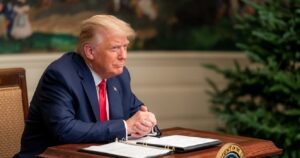Iran stands firm on nuclear enrichment in Fox News exclusive
Iran has dug in its heels, declaring it will not back down on nuclear enrichment despite the U.S. throwing everything but the kitchen sink at them.
In a bombshell interview with Fox News’ Bret Baier, Iranian Foreign Minister Abbas Araghchi made it crystal clear that Tehran’s nuclear program isn’t going anywhere, even as U.S. strikes have left their facilities in shambles and international sanctions loom larger than ever.
This saga kicked off with heightened tensions as security experts warned, just before recent U.S. and Israeli strikes, that Iran could whip up a nuclear weapon in days and multiple warheads in weeks. That’s a chilling thought for anyone keeping score. The U.S. has been relentless, aiming to choke off Iran’s enrichment capabilities entirely.
Iran’s defiant stance on enrichment
Last month, U.S. strikes hit hard, and Araghchi admitted the damage to Iran’s nuclear sites was “serious.” He didn’t sugarcoat it—enrichment has ground to a halt for now. The full extent of the wreckage is still being assessed by Iran’s atomic energy organization.
“Our facilities have been damaged – seriously damaged,” Araghchi told Baier. Well, that’s what happens when you play high-stakes poker with global powers. Actions, as they say, tend to have consequences.
Yet, despite the rubble, Iran’s resolve hasn’t budged an inch. Araghchi doubled down, framing enrichment as more than just science—it’s a badge of honor. “We cannot give up enrichment because it is an achievement of our own scientists,” he declared, practically daring the world to challenge Tehran’s pride.
National pride over practical needs
Here’s the kicker: Iran’s actual need for nuclear energy is laughably small, making up less than 1% of its energy consumption. So why the obsession? It’s not about keeping the lights on—it’s about flexing muscle on the world stage.
Back in early June, Iran’s Supreme Leader Ayatollah Ali Khamenei boasted about their capabilities, saying they can produce nuclear fuel “from the mine” to the power plant. That’s quite the chest-thumping for a nation under such intense scrutiny. Sounds like a point of pride that’s costing them dearly.
The U.S. has floated a reasonable idea—join a regional consortium with nations like the UAE and Saudi Arabia to source enriched uranium for civilian use. Iran’s response? A flat-out no, time and time again, as if compromise is a foreign concept.
International pressure mounts on Tehran
With international sanctions already biting hard, Iran faces even tougher arms restrictions if a nuclear deal isn’t reached by August’s end. It’s unclear whether that agreement must include the U.S. or just European powers like France, Germany, and the U.K. Either way, the clock is ticking louder than a drumline.
Araghchi didn’t shy away from the stakes in his chat with Baier, admitting, “Our enrichment is so dear to us.” Dear, sure—but at what cost? Clinging to this program while facilities lie in ruins seems less like pride and more like a stubborn refusal to read the room.
Meanwhile, Iran insists it’s not chasing nuclear weapons, a claim that’s met with understandable skepticism given the speed at which experts say they could arm up. Trust is a currency Tehran doesn’t have much of these days. And with no word on whether any enriched uranium survived the strikes, the mystery only deepens.
Diplomatic talks on the horizon
Looking ahead, Iran isn’t sitting idle—meetings with allies Russia and China are set for Tuesday, followed by talks with European officials from the E3 on Friday. These discussions could be make-or-break, but don’t hold your breath for a sudden change of heart. Tehran’s track record suggests more defiance than diplomacy.
As for the U.S., talks with Iran remain stalled since last month’s strikes. Washington’s patience is clearly wearing thin, and who can blame them? When a nation prioritizes national ego over global stability, it’s hard to find common ground.
So here we are, watching Iran cling to a nuclear program that’s brought them nothing but headaches, sanctions, and smoking facilities. If pride goeth before a fall, Tehran might want to check its footing. This isn’t just a policy debate—it’s a geopolitical tightrope, and the world is holding its breath.




